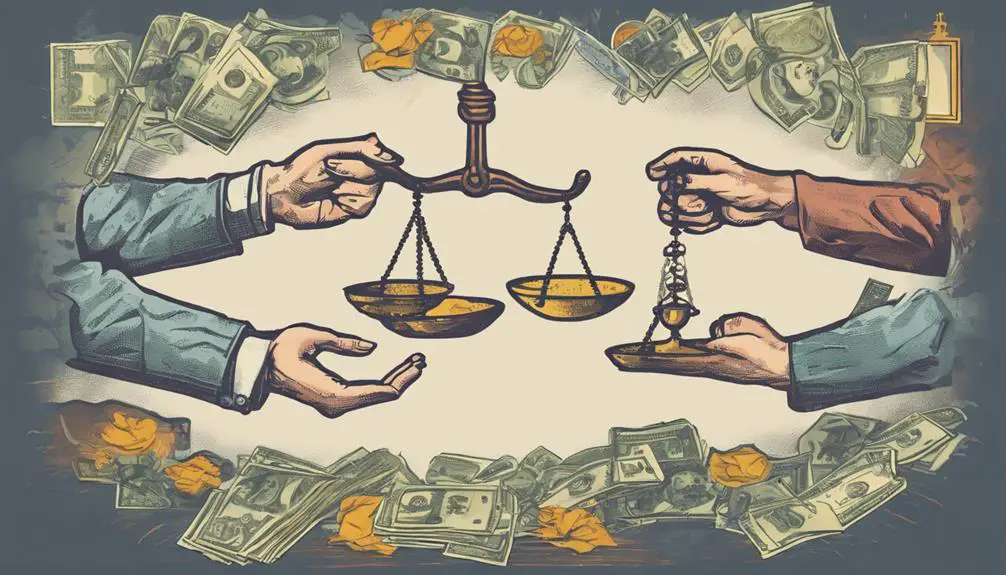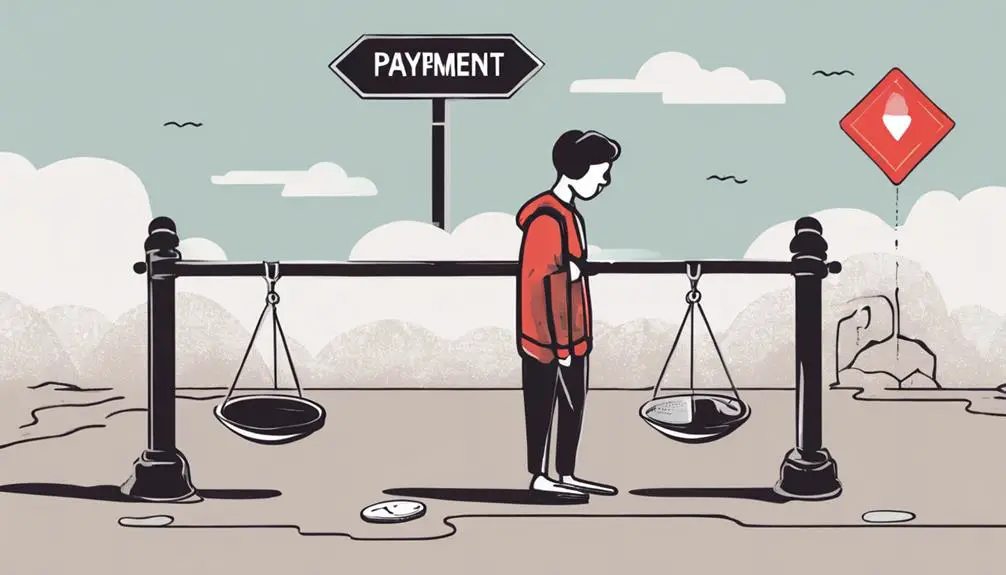When does borrowing money cross from necessity to sin? Explore the ethical maze of debt through history and religion.

Is Owing Someone Money a Sin?
Just as Dickens' Mr. Micawber famously warned of the woes of debt, you might wonder if owing someone money crosses a moral line. Throughout history, the concept of debt has been tangled with ethics, from ancient religious texts admonishing the practice to contemporary debates about its impact on society.
You're invited to explore whether the act of borrowing, beyond its financial implications, carries a weight of sin. What historical perspectives, religious doctrines, and ethical considerations shape our understanding of debt today? This discussion promises to uncover layers of thought you may not have considered before.
Key Takeaways
- Debt itself is not inherently sinful, but ethical lending and repayment practices are morally significant.
- Religions emphasize compassion, responsibility, and sometimes forgiveness in financial dealings, not the mere act of owing money.
- Ethical considerations in debt management focus on fairness and equity, rather than the morality of the debt itself.
- Managing debts responsibly is a moral obligation that supports both personal and societal well-being.
Historical Perspectives on Debt

Throughout history, societies have grappled with the concept of debt, viewing it through varying ethical, economic, and moral lenses. One of the most contentious aspects has been debt slavery, a practice where individuals who couldn't repay their debts were forced into servitude.
This extreme consequence of failing to fulfill a financial obligation highlights the gravity with which societies have historically perceived debt. Lending practices, too, have evolved significantly, reflecting changes in societal attitudes towards debt. Initially, lending was often informal, based on personal relationships and mutual trust.
Over time, however, as economies grew more complex, formal institutions emerged to regulate lending and borrowing, establishing legal frameworks to govern these transactions. This evolution from personal trust to institutional regulation underscores the shifting views on the ethical implications of owing money.
While debt slavery represents an extreme, historical responses to debt reveal a constant tension between the necessity of borrowing for economic growth and the potential for exploitation. Analyzing these practices offers insight into the broader ethical considerations that have shaped, and continue to shape, societal attitudes towards debt.
Religious Views on Owing Money
Delving into religious perspectives reveals a complex tapestry of beliefs surrounding the morality of owing money. Various faith traditions offer nuanced views on debt, emphasizing moral and ethical implications tied to lending practices and debt forgiveness.
- Compassion and Responsibility: Most religions advocate for compassion in lending practices, emphasizing the lender's responsibility to be fair and the borrower's duty to repay. This balance reflects a deeper understanding of mutual respect and ethical conduct in financial matters.
- Debt Forgiveness: Many religious texts highlight the importance of debt forgiveness, especially in times of hardship. This concept isn't merely about absolving financial obligations but is seen as a profound act of mercy that fosters community cohesion and personal redemption.
- Moral Obligations: The morality of owing money isn't just about the legal obligation to repay, but also involves the ethical duty to manage one's finances responsibly and avoid causing harm to oneself or others through reckless borrowing.
In essence, religious views on owing money intertwine financial transactions with moral and ethical considerations, advocating for practices that support societal wellbeing and personal integrity. Debt forgiveness and responsible lending aren't just financial mechanisms but are imbued with profound moral significance.
Ethical Considerations of Debt

Building on the religious perspectives, it's crucial to explore how ethical considerations shape our understanding of debt in modern society. Ethical considerations delve into the morality of both incurring and collecting debt, often scrutinizing the intentions behind lending practices and the fairness in repayment terms. It's vital to analyze whether lending practices are designed with equity in mind or if they disproportionately benefit the lender at the expense of the borrower.
Debt forgiveness emerges as a significant ethical concept, highlighting a conflict between the moral obligation to repay debts and the societal interest in providing relief to those overwhelmed by financial burdens. The ethics of debt forgiveness question whether absolving individuals or nations of their debts serves a greater good, potentially offering a fresh start to those trapped in cycles of poverty and financial instability.
Ethical scrutiny extends to how debt affects relationships between individuals and institutions. It examines the power dynamics at play, questioning if lending practices empower or exploit, and whether they foster mutual respect or perpetuate inequality. Through this lens, the ethical considerations of debt challenge us to rethink our approach to lending, borrowing, and the societal structures that underpin financial transactions.
The Impact of Debt on Society
Debt's ripple effects on society highlight significant disparities, influencing economic stability, mental health, and social mobility. When you examine the broader picture, it becomes clear that the consequences of debt extend beyond the individual debtor, affecting the very fabric of communities. Financial literacy plays a crucial role in understanding and managing debt, yet it's often lacking, leaving many vulnerable to the pitfalls of financial mismanagement.
Understanding debt psychology is essential for grasping why people fall into debt and how it affects their behavior and decisions. This knowledge is key to developing strategies that can mitigate the negative impacts of debt on society.
Consider the following points:
- Economic Stability: High levels of debt can lead to increased financial instability, affecting job security and housing markets. This, in turn, can trigger economic downturns that impact everyone, not just those in debt.
- Mental Health: The stress and anxiety associated with debt can lead to significant mental health issues, diminishing quality of life and productivity, which affects societal well-being as a whole.
- Social Mobility: Debt can act as a barrier to education and career advancement, perpetuating cycles of poverty and inequality that hinder social mobility and exacerbate societal divides.
Personal Responsibility and Repayment

Acknowledging the role of personal responsibility in debt repayment is crucial for understanding its impact on both individual and societal levels. You're not just managing your finances; you're also upholding your credibility and contributing to economic stability. Effective financial management is more than a personal achievement; it's a societal necessity. Your actions, whether timely repayment or neglect, ripple through the economy, influencing credit scores and, by extension, the accessibility of loans for others.
Aspect |
Individual Impact |
Societal Impact |
|---|---|---|
Timely Repayment |
Improves credit scores |
Enhances loan accessibility |
Neglect |
Damages credit scores |
Increases loan interest rates |
Financial Management |
Builds personal wealth |
Stabilizes the economy |
Responsibility |
Cultivates trust |
Promotes economic growth |
Your credit scores serve as a testament to your financial management skills. They're not just numbers; they're reflections of your trustworthiness and reliability in financial matters. Therefore, embracing personal responsibility in debt repayment isn't merely about settling dues; it's about fortifying trust, ensuring economic stability, and fostering an environment where credit is accessible and manageable for all.
Frequently Asked Questions
Can Owing Money Affect My Mental Health, and How Can I Manage Stress Related to My Debts?
Owing money can indeed impact your mental health, creating stress and anxiety. To manage this, consider exploring debt psychology and seeking financial counseling. These steps can help you understand and alleviate the psychological burden of debt.
Are There Any Positive Aspects of Having Debt, and Can It Ever Be Considered a Good Financial Strategy?
Indeed, debt can serve as investment leverage or aid in credit building, potentially enhancing your financial strategy. When managed wisely, it's not just about owing money; it's about strategically investing in your future.
How Do Cultural Differences Influence Perceptions and Attitudes Toward Debt and Borrowing Money?
Cultural differences significantly shape your views on debt and borrowing. Cultural stigmas and repayment traditions vary, affecting how you perceive and manage debt. It's important to understand these nuances in global financial practices.
What Are Some Modern Legal Protections for People Who Owe Money, and How Can They Navigate These Protections?
Modern legal protections for debtors include bankruptcy laws and credit counseling. You can navigate these by understanding your rights and seeking professional advice, ensuring you're making informed decisions about managing and potentially discharging your debts.
How Does the Concept of Debt Forgiveness Work, and Under What Circumstances Might Someone's Debt Be Forgiven or Reduced?
Debt forgiveness reduces or erases what you owe, often due to financial hardship. It can involve debt consolidation, adjusting interest rates, or direct cancellation. Circumstances vary widely, from personal bankruptcy to negotiated lender agreements.
Conclusion
In examining the historical, religious, and ethical perspectives on debt, it's clear that owing money isn't inherently sinful. However, the responsibility to repay what you owe is fundamental.
Different cultures and religions emphasize the moral obligation to honor debts, underscoring the profound impact debt can have on society.
Ultimately, your approach to debt reveals much about your values and integrity. It's crucial to navigate these obligations thoughtfully, balancing personal responsibility with compassion towards oneself and others.



Sign up